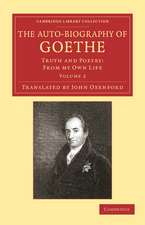Selected Works: Everyman's Library Classics & Contemporary Classics
Autor Johann Wolfgang von Goetheen Limba Engleză Hardback – 30 apr 2000
The Sorrows of Young Werther is a story of self-destructive love that made its author a celebrity overnight at the age of twenty-five. Its exploration of the conflicts between ideas and feelings, between circumstance and desire, continues in his controversial novel probing the institution of marriage, Elective Affinities. The cosmic drama of Faust goes far beyond the realism of the novels in a poetic exploration of good and evil, while Italian Journey, written in the author’s old age, recalls his youth in Italy and the impact of Mediterranean culture on a young northerner.
Translators include W. H. Auden, Louise Bogan, David Constantine, Barker Fairley, and Elizabeth Mayer
(Book Jacket Status: Jacketed)
Din seria Everyman's Library Classics & Contemporary Classics
- 8%
 Preț: 562.39 lei
Preț: 562.39 lei -
 Preț: 132.00 lei
Preț: 132.00 lei -
![Les Miserables [With Ribbon Marker]](https://i2.books-express.ro/bs/9780375403170/les-miserables-with-ribbon-marker.jpg) Preț: 282.88 lei
Preț: 282.88 lei -
 Preț: 172.02 lei
Preț: 172.02 lei - 8%
 Preț: 439.96 lei
Preț: 439.96 lei -
 Preț: 177.11 lei
Preț: 177.11 lei -
 Preț: 129.73 lei
Preț: 129.73 lei -
 Preț: 141.92 lei
Preț: 141.92 lei -
 Preț: 161.69 lei
Preț: 161.69 lei -
 Preț: 286.18 lei
Preț: 286.18 lei -
 Preț: 121.47 lei
Preț: 121.47 lei -
 Preț: 191.36 lei
Preț: 191.36 lei -
 Preț: 156.56 lei
Preț: 156.56 lei -
 Preț: 152.82 lei
Preț: 152.82 lei -
 Preț: 159.81 lei
Preț: 159.81 lei -
 Preț: 239.56 lei
Preț: 239.56 lei -
 Preț: 218.89 lei
Preț: 218.89 lei -
 Preț: 140.00 lei
Preț: 140.00 lei -
 Preț: 182.83 lei
Preț: 182.83 lei -
 Preț: 253.60 lei
Preț: 253.60 lei -
 Preț: 129.71 lei
Preț: 129.71 lei -
 Preț: 180.40 lei
Preț: 180.40 lei -
 Preț: 159.64 lei
Preț: 159.64 lei -
 Preț: 154.68 lei
Preț: 154.68 lei -
 Preț: 181.46 lei
Preț: 181.46 lei -
 Preț: 254.91 lei
Preț: 254.91 lei -
 Preț: 291.22 lei
Preț: 291.22 lei -
 Preț: 169.01 lei
Preț: 169.01 lei -
 Preț: 277.35 lei
Preț: 277.35 lei -
 Preț: 144.97 lei
Preț: 144.97 lei -
 Preț: 233.19 lei
Preț: 233.19 lei -
 Preț: 155.68 lei
Preț: 155.68 lei -
 Preț: 181.90 lei
Preț: 181.90 lei -
 Preț: 221.75 lei
Preț: 221.75 lei -
 Preț: 229.46 lei
Preț: 229.46 lei -
 Preț: 158.19 lei
Preț: 158.19 lei -
 Preț: 162.49 lei
Preț: 162.49 lei -
 Preț: 155.68 lei
Preț: 155.68 lei -
 Preț: 194.89 lei
Preț: 194.89 lei -
 Preț: 217.78 lei
Preț: 217.78 lei -
 Preț: 155.90 lei
Preț: 155.90 lei -
 Preț: 253.69 lei
Preț: 253.69 lei -
 Preț: 179.05 lei
Preț: 179.05 lei -
 Preț: 176.42 lei
Preț: 176.42 lei -
 Preț: 187.87 lei
Preț: 187.87 lei -
 Preț: 155.09 lei
Preț: 155.09 lei -
 Preț: 169.90 lei
Preț: 169.90 lei -
 Preț: 201.04 lei
Preț: 201.04 lei -
 Preț: 142.93 lei
Preț: 142.93 lei -
 Preț: 183.26 lei
Preț: 183.26 lei
Preț: 286.38 lei
Nou
Puncte Express: 430
Preț estimativ în valută:
54.81€ • 56.62$ • 45.61£
54.81€ • 56.62$ • 45.61£
Carte indisponibilă temporar
Doresc să fiu notificat când acest titlu va fi disponibil:
Se trimite...
Preluare comenzi: 021 569.72.76
Specificații
ISBN-13: 9780375410444
ISBN-10: 0375410449
Pagini: 1248
Dimensiuni: 125 x 218 x 54 mm
Greutate: 1.1 kg
Editura: Everyman's Library
Seria Everyman's Library Classics & Contemporary Classics
ISBN-10: 0375410449
Pagini: 1248
Dimensiuni: 125 x 218 x 54 mm
Greutate: 1.1 kg
Editura: Everyman's Library
Seria Everyman's Library Classics & Contemporary Classics
Notă biografică
Before he was thirty, Goethe had proven himself a master of the novel, the drama, and lyric poetry. But even more impressive than his versatility was his unwillingness ever to settle into a single style or approach; whenever he used a literary form, he made of it something new.
Born in 1749 to a well-to-do family in Frankfurt, he was sent to Strasbourg to earn a law degree. There, he met the poet-philosopher Herder, discovered Shakespeare, and began to write poetry. His play Götz von Berlichingen (1773) made him famous throughout Germany. He was invited to the court of the duke of Sachsen-Weimar, where he quickly became a cabinet minister. In 1774 his novel of Romantic melancholy, The Sorrows of a Young Werther, electrified all of Europe. Soon as he was at work on the first version of his Faust, which would finally appear as a fragment in 1790.
In the 1780s Goethe visited England and immersed himself in classical poetry. The next decade saw the appearance of Wihelm Meister's Apprenticeship, his novel of a young artist education, and a wealth of poetry and criticism. He returned to the Faust material around the turn of the century and completed Part 1 in 1808.
The later years of his life were devoted to a bewildering array of pursuits: research in botany and in a theory of colors, a novel (Elective Affinities), the evocative poems of the West-Easters Divan, and his great autobiography, Poetry and Truth. In his eighties he prepared a forty-volume edition of his works; the forty-first volume, published after his death in 1832, was the send part of Faust.
Goethe's wide-ranging mind could never be confined to one form or one philosophy. When asked for the theme of his masterwork, Faust, he could only say. “From heaven through all the world to hell”; his subject was nothing smaller.
Born in 1749 to a well-to-do family in Frankfurt, he was sent to Strasbourg to earn a law degree. There, he met the poet-philosopher Herder, discovered Shakespeare, and began to write poetry. His play Götz von Berlichingen (1773) made him famous throughout Germany. He was invited to the court of the duke of Sachsen-Weimar, where he quickly became a cabinet minister. In 1774 his novel of Romantic melancholy, The Sorrows of a Young Werther, electrified all of Europe. Soon as he was at work on the first version of his Faust, which would finally appear as a fragment in 1790.
In the 1780s Goethe visited England and immersed himself in classical poetry. The next decade saw the appearance of Wihelm Meister's Apprenticeship, his novel of a young artist education, and a wealth of poetry and criticism. He returned to the Faust material around the turn of the century and completed Part 1 in 1808.
The later years of his life were devoted to a bewildering array of pursuits: research in botany and in a theory of colors, a novel (Elective Affinities), the evocative poems of the West-Easters Divan, and his great autobiography, Poetry and Truth. In his eighties he prepared a forty-volume edition of his works; the forty-first volume, published after his death in 1832, was the send part of Faust.
Goethe's wide-ranging mind could never be confined to one form or one philosophy. When asked for the theme of his masterwork, Faust, he could only say. “From heaven through all the world to hell”; his subject was nothing smaller.
Recenzii
“Goethe’s greatness is singular: it is difficult to think of any parallel to his achievement . . . At every stage of a long and inwardly turbulent life he rediscovered, or reinvented, himself through his writing, and yet he never significantly repeated himself. For each of the ages of man, which he experienced in his own person, he found a new poetry.”
—from the Introduction by Nicholas Boyle
—from the Introduction by Nicholas Boyle
Descriere
Descriere de la o altă ediție sau format:
Johann Wolfgang Von Goethe (1749-1832) is one of the towering figures of world culture, a universal man whose extraordinary talents found expression in literature, drama, autobiography, politics and the sciences.
Johann Wolfgang Von Goethe (1749-1832) is one of the towering figures of world culture, a universal man whose extraordinary talents found expression in literature, drama, autobiography, politics and the sciences.









